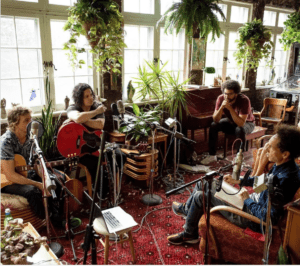 When Justin Richmond (’15) came to UC Berkeley from Southern California for his undergraduate studies in philosophy in 2009, he aspired to be a professor. Little did he imagine that his first job would involve booking Keith Richards for an interview and then stressing about him smoking cigarettes in the recording studio.
When Justin Richmond (’15) came to UC Berkeley from Southern California for his undergraduate studies in philosophy in 2009, he aspired to be a professor. Little did he imagine that his first job would involve booking Keith Richards for an interview and then stressing about him smoking cigarettes in the recording studio.
The pivotal in tracks came during his undergraduate years, when he was studying philosophy. “One of my professors, Rickey Vincent, used to do a radio show “The History of Funk” on KPFA, and it was through him that I got involved in radio, and realized that I was actually good at this,” Richmond said. The initial spark led him to get involved with KALX, the UC Berkeley student radio station.
“And then I found out that in this very campus, there is this amazing journalism school, and I decided to apply, with no hopes of getting accepted,” he said.
But he did get accepted and started his master’s program right after earning his undergraduate degree.
It was Ben Manilla, then-head of the audio program at the J-School who nurtured Richmond’s passion for audio journalism during his graduate studies.
Over two years, Richmond worked on many memorable projects, but the one that stands out was his thesis project, a long-form audio piece about Royce White, an NBA player from Minnesota whose struggles with anxiety were at odds with the Houston Rockets, the team that drafted him in 2012.
His thesis, and his other work at the School were impressive enough to land him a dream start in the world of audio journalism, a producer position at NPR’s flagship program “Morning Edition.” Richmond remembers it as a chaotic period where he went from student to professional in the span of a few weeks, with no break in the middle. “I think we graduated in May 2015, and I started working for NPR in June 2015, so pretty much straight out of college.”
It was at this job that he had the opportunity to meet rock legend Keith Richards, albeit not without a few hiccups.
“I was so excited, because he was by far the biggest guest that I had booked. And then, the night before he was to come to our studio and record the interview, his agent calls me up and asks if I can arrange for an ashtray for Keith because he wanted to smoke in the recording studio. Of course, smoking is prohibited in the booth because we have expensive equipment, but I’m not going to tell Keith Richards that!”
Richmond did not arrange for an ashtray, but Richards smoked throughout the interview anyway, a fact that is referenced in the episode, too.

Rick Rubin, Bob Weir and Justin Richmond on March 17, 2020.
Booking high-profile artists like Richards was a sign of things to come for Richmond. In 2018, he quit his job as an arts reporter at NPR and joined the newly formed Pushkin Industries as a producer for “Broken Record,” a podcast for music lovers in which recording artists talk about their music and the stories behind it. “I must have been the fifth or sixth employee at Pushkin. I remember using my personal email for all official work because we didn’t have our company emails yet.”
Three years into the job, Richmond also shares hosting duties now, with a stunningly accomplished group: journalist and author Malcolm Gladwell, music mogul and Def Jam Recordings co-founder Rick Rubin, and former New York Times media and video editor Bruce Headlam.
Sitting in on discussions with those hosts is a highlight for Richmond, as is interacting with some of music’s most iconic acts.
“We were in a studio recording an episode with Andre 3000 from Outkast and when we got there, we saw Neil Young sitting there, because he was going to record in the same studio that day. I am a big fan of both Outkast and Neil Young, but their musical styles are so different. … I could never imagine that their paths could cross, but they did, and I was there.”

Justin Richmond, second from right, with Malcolm Gladwell (right) interviewing Jack White and the Raconteurs, October 2019. Photo: by David Swanson.
Richmond says working in radio is not too different from his original ambition of becoming a professor and delivering lectures to people. The main difference is that the audience is not sitting in front of him but is tuning in to him from all over the world.
Today Richmond feels lucky that a lot of things have fallen into place for him since he first came to Berkeley. That is not to say that it has been easy. Richmond credits the hours of hard work he put into learning the craft of audio production and editing, and the faculty at the J-School — especially Manilla — for his relatively smooth professional life thus far.
His advice for journalism students is to make mistakes and explore as much as possible while learning the ropes. “Don’t be afraid to look stupid,” he said. “Your work is not going to be perfect, and if it is, you shouldn’t be in J-School. Explore as much as you can, and make mistakes while you can, because you’re not going to have that freedom once you enter the professional world and start your job.
By Tanay Gokhale (‘23)
